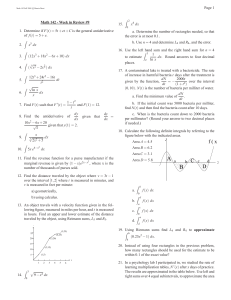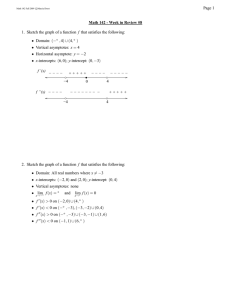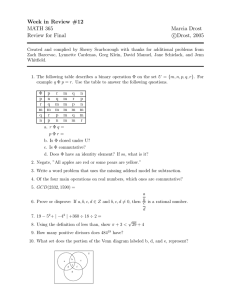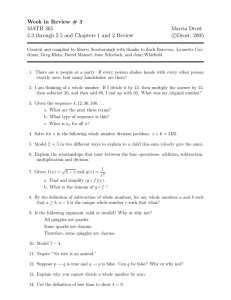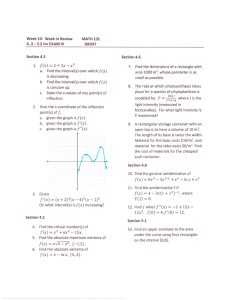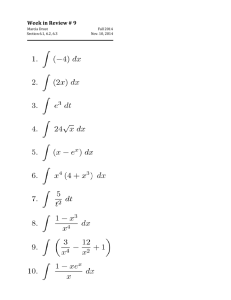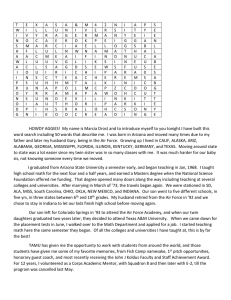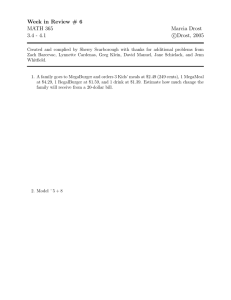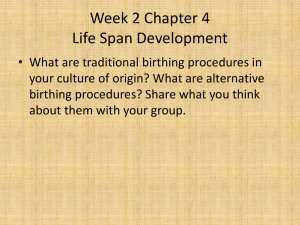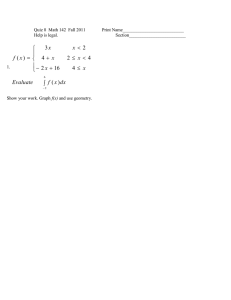Document 10591907
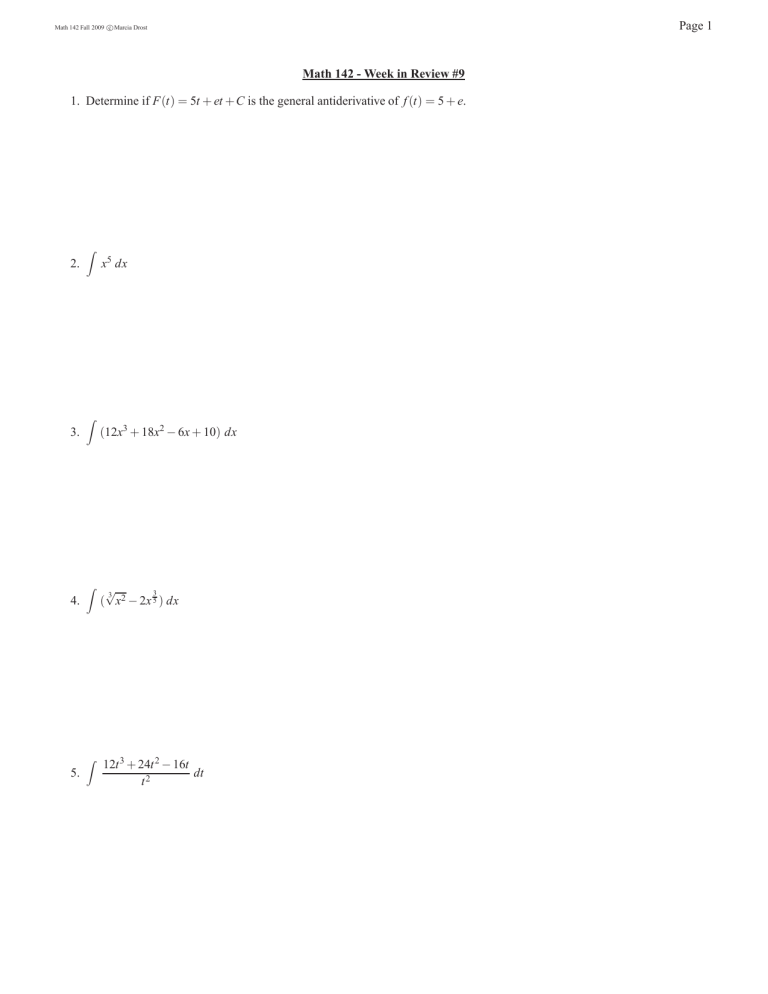
Math 142 Fall 2009 c Marcia Drost
Math 142 - Week in Review #9
1. Determine if F ( t ) = 5t + et + C is the general antiderivative of f ( t ) = 5 + e.
2.
Z x
5 dx
3.
Z
( 12x
3
+ 18x
2
− 6x + 10 ) dx
4.
Z
(
√ x 2
− 2x
3
5
) dx
5.
Z 12t
3 + 24t
2
− 16t t 2 dt
Page 1
Math 142 Fall 2009 c Marcia Drost
6.
Z
√ ln x dx x
7. Find F ( t ) such that F ′ ( t ) =
1 − t
2 t and F ( 1 ) = 12.
8. Find the antiderivative of dy dx given that dy dx
=
10x
2
− 6x + 20 x given that y ( 1 ) = 2.
9.
Z x
2x 2 + 5 dx
10.
Z
5x e
4 − x
2 dx
Page 2
Math 142 Fall 2009 c Marcia Drost
Page 3
11. Find the revenue function for a purse manufacturer if the marginal revenue is given by ( 1 − x ) e
2x − x
2 thousands of purses sold.
, where x is the number of
12. Find the distance traveled by the object where v = 3t − 1 over the interval [ 1
, measured in feet per minute:
2 ] where t is measured in minutes, and v is a) geometrically, b) using calculus.
13. An object travels with a velocity function given in the following figure, measured in miles per hour, and t is measured in hours.
Find an upper and lower estimate of the distance traveled by the object, using Reimann sums, L
5 and R
5
.
v
25
20
15
10
5 (1,5)
(2,12)
(3,20)
(4,23)
(5,25) t
1 2 3 4 5
6
14.
Z
3 p
9 − x 2 dx
0
Math 142 Fall 2009 c Marcia Drost
15.
Z
2 x
4 dx
0 a. Determine the number of rectangles needed, so that the error is at most 0.1.
b. Use n = 4 and determine L
4 and R
4
, and the error.
16. Use the left hand sum and the right hand sum for n = 4 to estimate
Z
3
2
1 ln x
dx. Round answers to four decimal places.
Page 4
17. A contaminated lake is treated with a bactericide. The rate of increase in harmful bacteria t days after the treatment is given by the function, dN dt
2000t
=
−
( 1 + t 2 ) over the interval ( 0
,
10 ) . N ( t ) is the number of bacteria per milliter of water.
a. Find the minimum value of dN
.
dt b. If the initial count was 5000 bacteria per milliter, find N ( t ) and then find the bacteria count after 10 days.
c. When is the bacteria count down to 2000 bacteria per millimeter? (Round your answer to two decimal places if needed.)
Math 142 Fall 2009 c Marcia Drost
18. Calculate the following definite integrals by referring to the figure below with the indicated areas.
y
Area A = 4
.
5 f ( x )
Area B = 6
.
2
Area C = 3
.
1
Area D = 5
.
8
A a
B b
C c
D d x a.
Z b
0 f ( x ) dx b.
Z d a f ( x ) dx c.
Z c
0 f ( x ) dx d.
Z a d f ( x ) dx
19. Using Riemann sums find L
4 and R
4 to approximate
Z
6
( 0
.
25x
2
− 1 ) dx.
4
Page 5
20. Instead of using four rectangles in the previous problem, how many rectangles should be used for the estimate to be within 0
.
1 of the exact value?
21. In a psychology lab I participated in, we studied the rate of learning multiplication tables, N ′ ( x ) after x days of practice. The results are approximated in the table below. Use left and right sums over 4 equal subintervals, to approximate the area under the graph of N ′ ( x ) from x = 3 to x = 15. Calculate an error bound for this estimate.
x 0 3 6 9 12 15 18
N ’(x) 0 25 21 18 12 9 5
Math 142 Fall 2009 c Marcia Drost
22. Given F ( x ) =
− x
2 + 30x + 120.
a. Calculate the change in F ( x ) from x = 4 to x = 12.
Page 6 b. Graph F ′ ( x ) and use geometry to calculate the area between the graph of F ′ ( x ) and the x-axis from x = 4 to x = 12.
23.
Z
4 e
5x dx
0
24. Find the average value of the function f ( x ) = 450 − 24x over the interval [ 0
,
10 ] .
